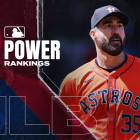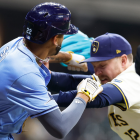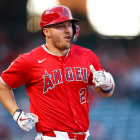While uncertainty surrounds in the ongoing negotiations between Major League Baseball and the MLB Players Association (MLBPA) on the structure of the 2020 season, commissioner Rob Manfred guaranteed we'll have baseball this year. Manfred, prior to the start of Wednesday's MLB draft, spoke with MLB Network and ESPN and said games will be played this summer, even if a new deal cannot be reached.
Tom Verducci of MLB Network asked Manfred whether he could guarantee that the 2020 season, which has been put on hold by the COVID-19 pandemic, will take place in some fashion. "We're going to play baseball in 2020, 100 percent" Manfred responded. "If it has to be under the March 26 agreement, if we get to that point in the calendar, so be it. But one way or the other we're playing Major League Baseball."
That, straight from the commissioner, is indeed tantamount to a guarantee that we'll at least start the 2020 season. How many games the regular season will entail, what the playoff structure will be, and whether or not a fall resurgence of COVID-19 will interrupt the season are all important unknowns right now. Per Manfred, though, a season will be attempted.
In his comments, Manfred is referencing the March 26 accord between MLB and the MLBPA in which players agreed to prorate their 2020 salaries based on the number of games played. As part of that same agreement, Manfred has the power to implement a regular season structure by fiat -- probably spanning 48 or 50 games -- should the two sides be unable to reach a negotiated settlement.
Owners also hope to expand the postseason for 2020 and perhaps beyond to 16 teams, but doing so requires the MLBPA to sign off on it. If Manfred implements a season structure without their approval, then players will be unlikely to consent to an expanded postseason. MLB badly wants an expanded postseason because so much of the national TV contracts are tied to playoffs, and more postseason games mean more revenues from rights-holders. So the floor for a 2020 season -- laying aside for the moment that it could be interrupted by COVID-19 -- would a 48-50 game regular season followed by a standard 10-team playoffs.
The complicating factor in all of this is that players consider the matter of compensation to be settled because of that March 26 agreement. As noted, they agreed to prorate based on the number of regular season games played. Owners, however, interpret that agreement as allowing them to renegotiate the matter of player salaries based on the likelihood that fans will not be able to attend games for most or even all of the 2020 season. While the owners' emphasis is on getting to the postseason as quickly as possible, players want a longer regular season for salary purposes. Those dueling incentives are underlying the present negotiations and the somewhat labored pace thereof.
Most recently, the players came down from a proposed 114-game regular season to 89 games and prorated salaries. That's a 25-game game concession, but Manfred on Wednesday in his interview with Karl Ravech of ESPN called an 89-game regular season slate "not realistic" on account of "where we are in the calendar."
As well, owners want players to take additional salary reductions over and above the prorated figures, and that's just as much of a sticking point as the length of the regular season schedule. Manfred on Wednesday reiterated that his side hopes the players will move off that demand, which, again, isn't likely to happen because the union considers the March 26 agreement to be the final word on compensation. As for what's ahead, Manfred says the owners are preparing their counter to the players' most recent proposal, and the commissioner says that next offer "will be another significant move in the players' direction in terms of the salary issue that kept us apart."
Most importantly, Manfred in his ESPN interview repeated what he said to MLB Network -- that there will indeed be a 2020 season, even if that means mandating one of not even a third of the usual 162-game length. "I would prefer to negotiate a new agreement with MLBPA that gets us more games and resolves the issue that separate us. ... If we have to, we'll exercise that right."






















